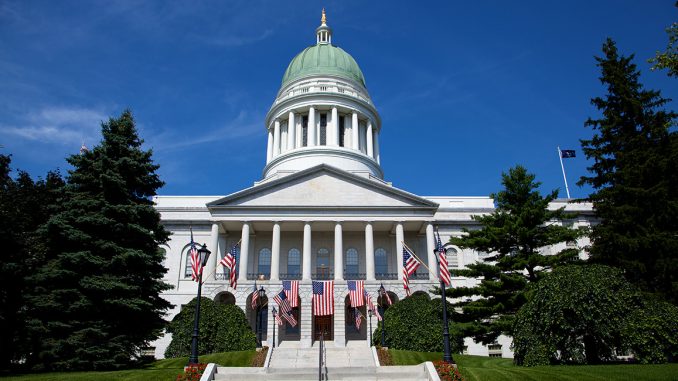
A bill in the Maine state legislature would protect transparency in education after a state official accused parents of “hate speech” for making government public records requests.
Introduced by state Rep. John Andrews, R-Paris, the bill would codify Maine’s version of the Freedom of Information Act, the Freedom of Access Act, and affirm that the requests are not “hate crimes.”
“It’s trying to be proactive in preventing governmental authorities and powerful associations from defining what is or is not a valid request for information,” Andrews told The Daily Signal.
The legislation was introduced after Vicki Wallack, an official from the Maine School Management Association and a member of a committee for reviewing FOAA requests, criticized a Maine parent, Shawn McBreairty for his requests for information on pornographic books, radical gender ideology, and critical race theory in public school curriculums.
“Personally, I believe these requests are just another form of hate speech,” Wallack said at a Maine “Right to Know” advisory committee meeting on Nov. 17, adding that she thinks the “burdensome” requests “target” LGBT students.
McBreairty has been fighting for educational freedom in Maine for nearly three years, he said. He trains other parents in the state on how to submit public records requests.
“I’ve been trying to engage more parents in Maine and across the country to know that the Freedom of Access Act or Information Act is in existence, and that’s how you can fight against the lack of transparency,” McBreairty told The Daily Signal. “All of the censorship that’s occurring to taxpayers and parents in the country, you can somewhat defeat that if you just simply know what the Freedom of Access Act is in your state, and then you’re able to present an email to ask for information.”
The father of twin daughters has sent about 100 FOAA requests to dozens of school districts. In November, McBreairty testified about the costs and delays he has faced for his requests in front of Maine’s “Right to Know” advisory committee, prompting Wallack’s “hate speech” comments.
Wallack’s remarks inspired Andrews to propose the bill. The representative said parents should have “free, fair, and transparent” access to curriculums taught in government-run schools.
“When somebody in power starts talking like that,” Andrews said of Wallack, “it’s our job to protect transparency and the rights of our constituents.”
Andrews expects the quantity of FOAA requests to increase after Maine Department of Education Commissioner Pender Makin told lawmakers on March 15 that reading, writing, and math should “take a backseat” to social-emotional learning, critical race theory, and gender ideology.
Andrews said he has confidence the legislation can pass, despite the Democratic majority in Maine’s House of Representatives, the state Senate, and the governor’s mansion. He hopes the Democrats on the Judiciary Committee, to which the bill was referred on Feb. 16, believe in free speech and dislike censorship.
“I don’t know why anybody would want to be on record voting that a FOAA request can be considered a ‘hate crime,’ and we need to explicitly state that FOAA requests are, in fact, not hate speech or hate crimes,” he said.
McBreairty testified on behalf of the bill in a March 21 public hearing, citing the instances of “critical race theory in Maine public schools starting in kindergarten” that he has uncovered though public information requests. He also mentioned “transgender library book displays” and pornographic book lists for 11-year-olds revealed through his use of the Freedom of Access Act.
“We’ve exposed the number of evil, horrible issues that are happening in our Maine school system,” McBreairty said. “The transparency process is how we dig into finding out about these things that parents want to really know about.”
Transparency is “something the parents and taxpayers of Maine deserve, since we are paying almost $3 billion for our horrific Maine K-12 public education system,” according to McBreairty.
“Maine should have full transparency, not willful violations, delays, and games played with abusive charges,” he said in his remarks before the Judiciary Committee.
Maine’s education system reflects the low-quality curriculums taught in schools, according to McBreairty. Only 24% of Maine students performed at or above the National Assessment of Educational Progress proficient level in 2022, dropping from 34% in 2019, according to The Nation’s Report Card.
“The reason we’re asking these questions is because at no time in our history has the educational assessments in our statement been worse, and our taxes been higher,” McBreairty said. “You’re getting a tremendously horrible return on your investment because we’re paying more and getting less every year.”
Public schools are scared for parents to find out what they’re teaching kids, but parents are waking up to “critical race theory, the hypersexualization of minors, [and] social emotional learning,” he explained.
“They don’t want the exposure to be provided because the more exposure these woke organizations that are technically trying to run schools get, the more parents are pulling their kids,” he said.
The Freedom of Access Act safeguards parental involvement in education, a nonnegotiable for successful schools, Andrews said.
“For success in education, it’s fundamental for parents to be involved with what their children are learning and reading, to help them at home and talk about things that they experienced during their day in school,” Andrews said. “When schools don’t want to reveal what they’re teaching or instructing to parents, then you have to ask why.”
Have an opinion about this article? To sound off, please email letters@DailySignal.com and we’ll consider publishing your edited remarks in our regular “We Hear You” feature. Remember to include the url or headline of the article plus your name and town and/or state.

